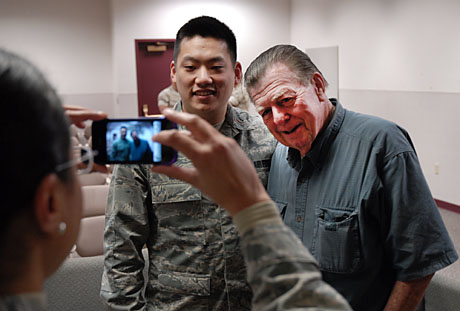DINFOS students awed by war correspondent’s tales

Joseph L. Galloway recounted his experiences to students and faculty members March 31 at the Defense Information School. The co-author of "We Were Soldiers Once and Young," Galloway based the book on his experiences as a war correspondent for United Press International in Vietnam. (Photo by Rick Corral)
By Navy Lt. David Luckett
Special to Soundoff!
One of America’s most accomplished war correspondents kept more than 100 students and faculty at the Defense Information School in awe as he intertwined his experiences of the past with lessons for the future.
Joseph L. Galloway, most famous for the book he co-authored, “We Were Soldiers Once … and Young,” which was later adapted into the movie “We Were Soldiers” starring Mel Gibson, spoke March 31.
“I think the audience wanted to hear someone tell it like it is, without a hint of spin or compromise,” DINFOS Public Affairs Department instructor Bill Lincicome said. “I think we all deeply appreciate and respect someone like Joe Galloway who just wants to tell the truth, because the truth is the only currency we PAs have.”
Galloway accepted the invitation to talk with DINFOS students so he could revel in one of his greatest passions — spending time with service members.
After watching some video clips from the 2002 movie depicting his exploits in Vietnam as part of his introduction, Galloway immediately made clear the candidness he would deliver by revealing that viewing just parts of the movie brought him to tears yet again.
The visit was originally scheduled as a question-and-answer session for students in the Public Affairs Qualification Course. But school leaders wanted to maximize the opportunity and opened the discussion to students from other courses and all faculty.
“This was the second time I’ve heard Mr. Galloway speak in person,” Lincicome said. “The first time was 18 years ago, and his comments then about just telling the truth deeply resonated with me. It was a theme I’ve encouraged in my Airmen when I was in the Air Force, and I still tell my students that today.”
Dressed in jeans and a short-sleeved, earth-tone blue shirt you would expect from a war correspondent, Galloway gripped the podium and cocked his head to seemingly better-ensure his lessons hit their targets. His insights ranged from what makes a good writer to why, to this day, he views the U.S. Army as his army.
“You want to know how I became a good writer? I read a lot. I read a lot of good writing,” the 61-year-old said while summarizing his journalism education as self-educated. “Love of Soldiers and Marines doesn’t make you a bad reporter; it makes you a better reporter. I enjoyed unprecedented access and trust with the military. But I got it the old-fashioned way — I earned it.”
His audience ranged from 18-year-old Soldiers receiving their initial training after boot camp to an 81-year-old retired Army sergeant major who served in wars in Korea, Vietnam and Iraq and wouldn’t miss the opportunity to hear Galloway’s frankness for a third time.
“I’m not surprised at all he would take time out of his schedule to talk with this audience,” said retired Sgt. Maj. Raymond J. Moran. “If he has the chance to talk with Soldiers, he won’t pass it up. There’s a mutual respect and love between Joe Galloway and Soldiers. What he says comes from his heart. His emotion gets right to the heart of you. He lived with Soldiers and saw Soldiers die.”
Galloway, who has covered U.S. military operations over the past five decades, was the only civilian to receive the Bronze Star Medal in Vietnam — with “V” for valor no less — for his actions in the Battle of the Ia Drang.
“If there was going to be a war in my generation, I wanted to cover it. And I wanted to cover it from as far forward as I could get,” Galloway said. “How you become a famous war or foreign correspondent is you go forward to where the action is and make friends with the second lieutenants and captains. Then you stay alive long enough for those friends to grow into colonels and generals.”
Galloway explained why he covered the Vietnam War with his own weapon and extra water canteens. “In war you will work on water and need more ammo,” he said. “I had both.”
Galloway delivered his remarks with a razor-sharp recollection of meetings with senior military leaders such as former Secretary of Defense Donald Rumsfeld and retired Gen. Norman Schwarzkopf.
When recalling his best piece of writing, the award-winning journalist referred to the epilogue for “We Were Soldiers Once … and Young.” Writing at 3 a.m., Galloway explained how he had to go outside to keep from waking and scaring his family because he was weeping out loud.
The last question he had time for: What was his biggest challenge when working with the services?
“I can’t tell you,” Galloway said. “I can’t tell you because I’ve never felt challenged by working with Soldiers and Marines. I knew my story was going to end up in Stars and Stripes in the hands of [a Soldier] in the company I was with, or in the hands of a momma in a small town who was proud to show her family and neighbors what her son was doing. That made it all worth it. But I’ve never been badly received by any unit in all these years.”
With that, he stopped talking and took time for pictures and autographs with service members, the same ones who had just given him his second standing ovation of the afternoon.
Luckett is a member of the DINFOS Public Affairs Office.